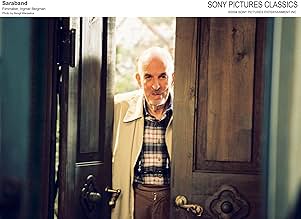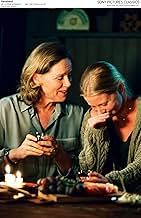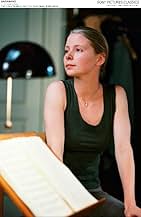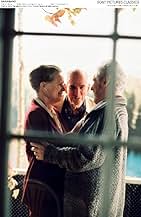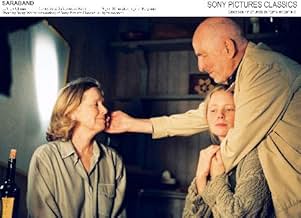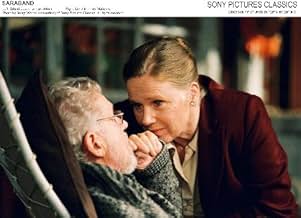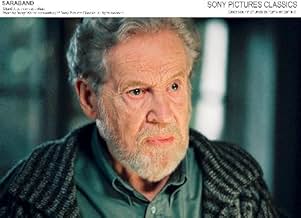Unos treinta años después de divorciarse de Johan, Marianne decide ir a la casa de verano de su exmarido para hacerle una visita. Al llegar, se encuentra en medio de un drama familiar entre ... Leer todoUnos treinta años después de divorciarse de Johan, Marianne decide ir a la casa de verano de su exmarido para hacerle una visita. Al llegar, se encuentra en medio de un drama familiar entre el hijo de Johan, de otro matrimonio, y su nieta.Unos treinta años después de divorciarse de Johan, Marianne decide ir a la casa de verano de su exmarido para hacerle una visita. Al llegar, se encuentra en medio de un drama familiar entre el hijo de Johan, de otro matrimonio, y su nieta.
- Premios
- 2 premios y 3 nominaciones en total
Argumento
¿Sabías que...?
- CuriosidadesThe film is very autobiographical. The character of Anna is actually Ingrid von Rosen, Ingmar Bergman's wife, who died of cancer, and was his greatest love. The photography of Anna used in the film is also of Ingrid. The movie is also dedicated "to Ingrid", as stated in the opening title screen.
- PifiasThere are some interesting discrepancies in relation to the time line of the characters. The ages given for the characters are 63 (Marianne), 86 (Johan) and 61 (Henrik). Marianne says that she has not seen Johan for 32 years and that they had been married for 16 years. This means that she married Johan when she was 15 and he was 38. Johan had a falling out with his son when Henrik was 18/19, which must have been after Johan's marriage to Marianne.
- Citas
Henrik: Dad, where does all this hostility come from?
Johan: Speak for yourself. When you were 18 or 19, I tried to get close to you. You'd been seriously ill, and your mother wanted us to talk things out. I said to you, "I know I've been a bad father, and I want to do better." And you screamed at me--yes, screamed--"A bad father? You've never been a father at all!" Then you said you could do without my forced exertions. One should respect honest hatred, and I respect yours. But I really couldn't care less if you hate me. You barely exist. If it weren't for Karin, who thank God takes after her mother, you wouldn't exist for me at all. So there's no hostility here, I assure you.
- ConexionesFeatured in Bergman och filmen, Bergman och teatern, Bergman och Fårö (2004)
- Banda sonoraCello Suite no. 5 in C Minor, Movement 4: Saraband
Composed by Johann Sebastian Bach
Performed by Torleif Thedeen (as Thorleif Thedeen)
Liv Ullman and Erland Josephson, the original screen couple from Bergman's 1973 film Scenes of a Marriage, reunite in his summer home for their first face to face contact since their breakup. Johan has become very wealthy as a result of an inheritance. Marianne is a lawyer and they have two daughters from their failed marriage: Sara who is married to a prominent lawyer and lives in Australia and Martha who is in a mental institution and does not recognize her mother. Johan is surprised by his ex-wife's visit but they still hold hands and try to remember the good things about the past, though Johan's interest seems to be minimal. Living nearby are Henrik (Borje Ahlstedt), Johan's son from a second marriage and his daughter Karin (Julia Dufvenius), a promising young cellist. Henrik and Karin have an uncomfortably strong attachment and mutual need as a result of the recent death of Anna, Henrik's wife who was deeply loved.
Henrik is training his daughter in the cello to prepare her for an audition at the local conservatory but has to turn to Johan for financial support who uses the occasion to humiliate him. Karin is contemplating going to Europe to work for an orchestra but is afraid of the consequences for Henrik if she leaves. Relationships between the family are strained, seemingly beyond repair and their world is filled with childish resentments and regrets. Karin resents her father for suffocating her emotionally. Marianne still resents Johan for his unfaithfulness. Henrik resents his father for -- not being a father. Johan resents Henrik for not being the son he wanted. No one can see beyond their ego to feel the needs and wants of others. The emotional pain is real but I found the end result to be facile and unconvincing.
Saraband has received high praise as a "lacerating examination of life's conundrums that is exhilarating in its fearlessness and its command", and an "affective, touching, and ultimately highly affirming picture of familial turmoil and the curative, as well as destructive, powers of love." But what I ask is this - What new insights do we gain about the human condition from witnessing a family go at each other with unbridled ruthlessness? In offering his audience the latest generation of "emotional illiterates", Bergman lets us see the clawing and fighting but hides the life-affirming reality that people are capable of transcending their limitations.
In Saraband, there is no self- reflection, responsibility, or hint that people can change with the passage of time. His characters only seem to have been able to refine their capacity for collecting grievances. When Henrik is suffering, no one talks about him, goes to visit him, or seems in the least concerned. Is this the way Bergman after all these years sees human relationships? Is this the legacy he wants to leave us? Despite its considerable strengths, Sourband (sic) is a bitter and despairing film that left a bad taste in my mouth.
- howard.schumann
- 24 jul 2005
- Enlace permanente
Selecciones populares
- How long is Saraband?Con tecnología de Alexa
Detalles
- Fecha de lanzamiento
- Países de origen
- Sitio oficial
- Idiomas
- Títulos en diferentes países
- Sarabanda
- Empresas productoras
- Ver más compañías en los créditos en IMDbPro
Taquilla
- Recaudación en Estados Unidos y Canadá
- 645.634 US$
- Fin de semana de estreno en EE. UU. y Canadá
- 34.304 US$
- 10 jul 2005
- Recaudación en todo el mundo
- 975.181 US$
- Duración1 hora 47 minutos
- Color
- Mezcla de sonido
Contribuir a esta página





